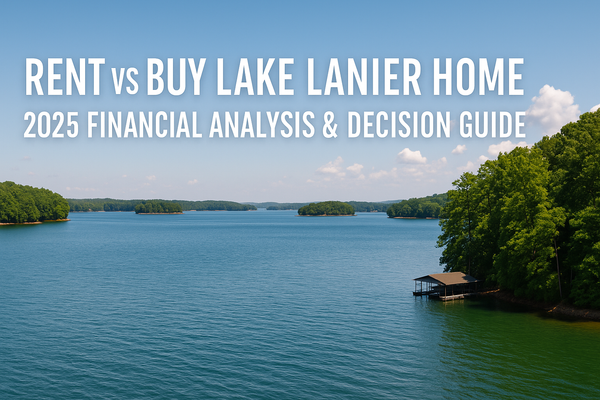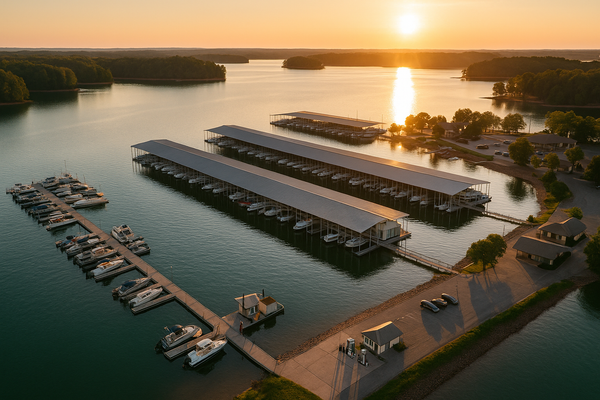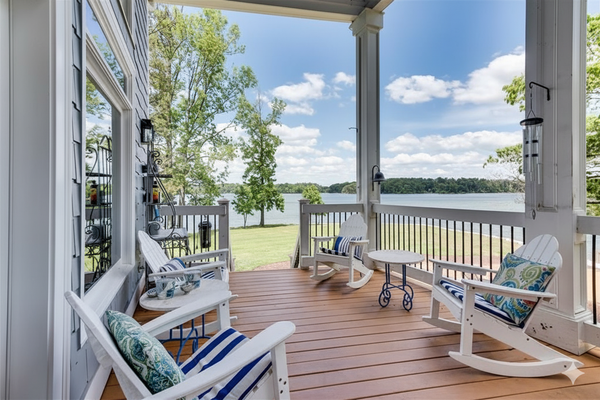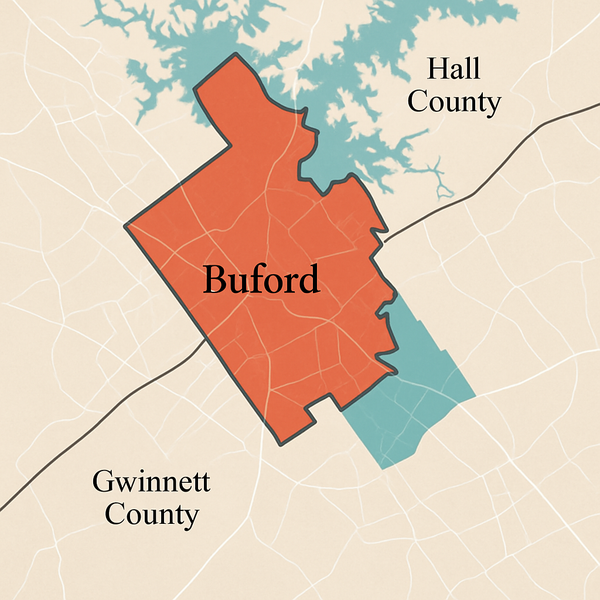Living in Buford, GA: 12 Brutal Truths (Pros & Cons 2025)
Every real estate market has its champions and critics, its genuine advantages and carefully unmentioned drawbacks. Buford, Georgia sits at a unique intersection—gateway to Lake Lanier's recreational paradise, home to some of Georgia's top-rated schools, and suburban anchor just close enough to Atlanta for reasonable commutes yet far enough to maintain distinct identity. But honest evaluation requires examining both the compelling reasons thousands choose Buford annually and the legitimate challenges that cause others to look elsewhere.
This isn't a sales pitch disguised as balanced analysis. It's a frank assessment of what life in Buford is really like—based on firsthand experience, real client feedback, and data from local sources. Whether you're considering a move to Lake Lanier or comparing North Georgia suburbs, here's a clear-eyed look at Buford's pros and cons before you buy.
Living in Buford, GA — Quick Pros & Cons
Short on time? Here’s the honest snapshot before we go deep.
Pros
- Top-rated schools: Buford City Schools drive demand and support long-term home values.
- Lake Lanier access: Fast reach to boating, fishing, and waterfront dining—true four-season recreation.
- Family-oriented culture: Youth sports, parks, festivals, and engaged community.
- Strategic location: Near I-85/I-985/GA-20, with strong healthcare and major retail close by.
- Diverse housing: From established neighborhoods to luxury lakefront; solid value retention.
- Tax/service balance: Generally favorable versus intown alternatives for the quality of schools and amenities.
Cons
- Traffic: GA-20, Mall of Georgia, and I-85/I-985 corridors clog at commute and weekend peaks.
- Premium pricing: School zone + lake proximity raise buy-in and ongoing lifestyle costs.
- Limited walkability: Outside downtown, most errands are car-dependent.
- Seasonal crowds: Summer lake traffic and tourist pressure impact ramps, restaurants, and noise.
- Commercial corridor feel: Busy big-box areas contrast with quaint downtown.
- School zoning complexity: “Buford address” ≠ Buford City Schools—parcel-level verification required.
- Climate & regs: Hot/humid summers, storms, Corps dock rules, and water-level variability for lakefront.

The Complete Truth About Living in Buford, GA: An Honest Assessment for Lake Lanier Homebuyers
Every real estate market has its champions and critics, its genuine advantages and carefully unmentioned drawbacks. Buford, Georgia sits at a unique intersection—gateway to Lake Lanier's recreational paradise, home to some of Georgia's top-rated schools, and suburban anchor just close enough to Atlanta for reasonable commutes yet far enough to maintain distinct identity. But honest evaluation requires examining both the compelling reasons thousands choose Buford annually and the legitimate challenges that cause others to look elsewhere.
This isn't a sales pitch disguised as balanced analysis. It's a frank assessment of what living in Buford actually entails—the traffic you'll navigate, the premium you'll pay, the lifestyle you'll gain, and the tradeoffs you'll make. For those exploring Lake Lanier living or evaluating the cost to live on Lake Lanier, understanding Buford's reality rather than its marketing narrative proves essential for decisions you'll live with for years or decades.
The Undeniable Advantages: Why Buford Works
Buford City Schools: The Gold Standard Driving Decisions
Buford City Schools consistently rank among Georgia's best, creating the single most powerful draw for families relocating to the area. This isn't marketing hyperbole—it's measurable reality reflected in test scores, college acceptance rates, and championship athletics spanning multiple sports. The smaller city school district creates tighter community connections and school pride that larger county systems struggle to replicate despite greater resources.
The academic reputation extends beyond standardized testing to encompass robust arts programs, competitive athletics, and extracurricular offerings that prepare students for diverse post-graduation paths. Parents report high teacher quality, responsive administration, and genuine investment in student success that justifies the premium Buford addresses command. The school system's excellence doesn't just benefit current students—it supports long-term home values as successive generations of families compete for access to these educational opportunities.
However, critical understanding requires acknowledging that “Buford address” doesn't automatically mean Buford City Schools. Parts of ZIP codes 30518 and 30519 fall into Gwinnett County or Hall County school systems, creating confusion for buyers who assume postal addresses determine school assignments. Verifying school zoning at the parcel level before making offers prevents the expensive disappointment of purchasing homes for school access that doesn't actually exist. When evaluating Lake Lanier real estate market trends, notice how properties zoned for Buford City Schools command premiums over otherwise comparable homes in adjacent county systems.
Lake Lanier Access: Recreation Without Relocation
Quick access to boating, fishing, kayaking, and waterfront dining distinguishes Buford from landlocked Atlanta suburbs where lake recreation requires full-day commitments including significant drive time. Many residents maintain boats at nearby marinas or dry storage facilities, using public access points for weekend recreation that defines their lifestyle rather than occupying occasional vacation slots.
This lake proximity represents genuine differentiation versus most Atlanta suburbs and enhances year-round recreation options extending well beyond summer swimming. Winter fishing, spring hiking around lake parks, fall foliage cruises, and shoulder-season paddling create four-season engagement impossible at purely summer-focused destinations. The recreational infrastructure—marinas, restaurants, parks, and services—supports spontaneous outings rather than requiring extensive planning that often prevents activities despite good intentions.
For those comparing North vs South Lake Lanier locations, Buford's southern position provides quickest Atlanta access while maintaining comprehensive lake amenities. This geographical advantage matters significantly for professionals balancing metropolitan employment with lake lifestyle priorities, eliminating the either-or choice that forces difficult compromises.
Historic Downtown: Third Place Community Building
Downtown Buford blends preserved historic character with modern restaurants, boutiques, theater arts presence, and community events that create authentic gathering spaces beyond home and work. The walkable core features local eateries and small businesses that foster community connections impossible in purely residential subdivisions or commercial strips lacking pedestrian infrastructure.
The city's commitment to maintaining downtown's character while encouraging appropriate development has created that rare suburban achievement—a genuine downtown that functions as community heart rather than tourist attraction or abandoned relic. Regular festivals, farmers markets, and cultural events bring residents together around shared experiences that build the social capital making neighborhoods feel like communities rather than collections of houses.
This “third place” function—spaces beyond home and work where community forms—proves increasingly valuable as suburban isolation grows and digital communication replaces face-to-face interaction. Downtown Buford provides antidote to that isolation for residents willing to engage, though the limited geographical extent means most Buford residents still live primarily car-dependent lives with downtown representing occasional destination rather than daily presence.
Diverse Housing Stock Supporting Various Life Stages
The mix of established neighborhoods, new construction, and luxury lakefront properties accommodates buyers across life stages and budget ranges. Starter homes in established neighborhoods provide entry points for young families prioritizing school access over cutting-edge finishes. Move-up buyers find substantial homes in mature neighborhoods with large lots and established landscaping. Luxury buyers access lakefront properties and premium new construction serving high-end market segments.
This diversity prevents the monoculture that makes some suburbs feel homogeneous and unwelcoming to those outside narrow demographic profiles. Buford accommodates singles and families, young professionals and retirees, first-time buyers and luxury purchasers—though always with the school-quality premium that elevates all price points above comparable homes in lesser-ranked districts.
Values tend to hold well due to schools, lake demand, and proximity to job corridors along I-985 and I-85. Properties prove good fits for move-up buyers and long-term holds rather than speculative flips, with appreciation reflecting genuine demand fundamentals rather than boom-bust cycles. When researching Lake Lanier home inspections, understand that Buford's value retention makes thorough inspection investments worthwhile—you're likely holding these properties long enough that deferred maintenance becomes your problem rather than next owner's concern.
Strategic Location Balancing Access and Identity
Reasonable access to I-85, I-985, and GA-20 connects Buford to Gwinnett, Hall, Forsyth, and broader northeast Atlanta employment centers without sacrificing distinct community identity. The positioning provides suburban convenience—abundant shopping including Mall of Georgia area, diverse dining, entertainment options—while maintaining separation from Atlanta's urban intensity.
Healthcare access through facilities in both Gwinnett and Hall counties provides quality medical care without Atlanta drives for routine needs. The concentration of medical services reflects population density and economic vitality that support comprehensive healthcare infrastructure increasingly important as residents age and medical needs intensify.
The location works particularly well for professionals employed in northeast corridor growth areas who want lake lifestyle without mountain remoteness. This sweet spot positioning—accessible but distinct, convenient but separate—explains much of Buford's appeal and ongoing growth despite challenges discussed below.
Family-Oriented Community Culture
Youth sports, parks, festivals, and school-centered community culture create environments where raising children feels supported rather than isolated. The variety of churches, fitness options, and family-friendly venues facilitates building local networks that transform subdivisions into communities where neighbors actually know each other.
This family orientation runs deep enough to affect community character and priorities. City planning, business development, and public services reflect family needs and preferences, creating self-reinforcing cycles where family-friendly attributes attract more families whose presence justifies additional family-oriented development and services.
Property Tax Considerations
While not the lowest in the region, Buford property taxes often compare favorably to closer-in Atlanta neighborhoods, especially relative to school quality received. Understanding Lake Lanier property taxes by county proves essential since Buford properties span Gwinnett and Hall counties with different millage rates and assessment practices affecting actual tax bills beyond headline rate comparisons.
The tax-to-service ratio generally favors Buford compared to intown Atlanta, where higher rates don't necessarily deliver better schools or services. This financial efficiency particularly appeals to families where school quality justifies premium housing costs but additional tax burden would strain budgets beyond breaking points.
The Legitimate Drawbacks: What Marketing Glosses Over
Traffic Congestion: The Suburban Tax You'll Pay
GA-20, Buford Drive near Mall of Georgia, and I-85/I-985 interchanges experience heavy congestion during commute hours and weekend retail peaks. This isn't occasional inconvenience—it's predictable daily reality that adds 15–30 minutes to trips that should take half that time. Lake-season weekends compound pressure around marinas and access points, transforming short drives into frustrating crawls.
The traffic reflects Buford's success and growth, but success doesn't make congestion less maddening when you're sitting in it. Prospective buyers must time commutes along actual routes during their specific peak-hour windows rather than relying on GPS estimates based on off-peak conditions. That 25-minute estimate becomes 45-minute reality when timed during actual commuting conditions, fundamentally changing work-life balance calculations and daily quality of life.
Mall of Georgia area traffic particularly frustrates, with retail concentration creating weekend congestion rivaling weekday commute backups. The convenience of abundant shopping comes with the cost of fighting crowds and traffic whenever you need to access those services—a tradeoff that some embrace while others find intolerable.
Premium Pricing: Paying for Privilege
Premium pricing for Buford City Schools and lake proximity can price out first-time buyers and force compromises that wouldn't be necessary in less desirable districts. Lakefront inventory commands luxury pricing often exceeding $1 million for properties that would cost half that amount without water access. New construction with larger footprints pushes price points higher as builders target move-up and luxury segments over starter home buyers.
This pricing reality means Buford increasingly caters to established buyers with substantial equity or high incomes rather than young families beginning homeownership journeys. The cost to live on Lake Lanier extends beyond purchase prices to ongoing expenses including higher insurance, maintenance, and lifestyle costs that accompany premium locations.
Comparing new construction versus existing homes reveals price-to-value relationships that sometimes favor existing inventory despite new construction appeal. Builder premiums for customization and cutting-edge features don't always translate to proportional value increases, making existing homes in desirable neighborhoods compelling alternatives for budget-conscious buyers.
Limited Walkability Beyond Downtown Core
Outside historic downtown and a few newer mixed-use pockets, most Buford neighborhoods require cars for errands and dining. Sidewalk connectivity varies dramatically between neighborhoods, with many established areas lacking pedestrian infrastructure that makes walking practical for transportation rather than recreation. Plan on driving for most daily needs regardless of how close amenities appear on maps—distance without sidewalks might as well be miles.
This car dependence matters increasingly as gas prices fluctuate, environmental awareness grows, and multi-car households juggle vehicle availability. The lifestyle requires reliable transportation for all driving-age household members, adding costs and complexity that genuinely walkable communities avoid.
For retirees or those anticipating aging in place, car dependence creates eventual challenges when driving becomes difficult or impossible. The absence of robust public transportation or ride-sharing alternatives means losing driving privileges can force relocation—an important consideration for long-term planning that gets overlooked during healthy, mobile decades preceding that reality.
Seasonal Crowding and Tourist Pressure
Summer brings heavier boat traffic, busier waterfront restaurants, and more noise around popular lake zones. Popular boat ramps and parks fill quickly on weekends, requiring early arrivals for access or acceptance that weekend prime time belongs to crowds rather than peaceful recreation. The tourist and seasonal visitor influx changes lake character substantially, with shoulder seasons offering dramatically different experiences than peak summer weekends.
This seasonal variation means February lake exploration differs fundamentally from July 4th weekend chaos. Buyers focused on summer recreation might embrace crowds as part of vibrant lake culture, while those seeking peaceful water experiences may find peak season intolerable. Understanding Lake Lanier water levels and seasonal patterns proves essential for realistic expectations about when and how you'll actually use lake amenities.
Commercial Corridor Character: Busy Suburban Realities
Near Mall of Georgia and along GA-20, big-box retail and constant activity create busy suburban environments contrasting sharply with quaint downtown. Choose neighborhood locations carefully if seeking quiet and low traffic—not all Buford addresses offer the peaceful lake-town character that marketing emphasizes. Some areas feel indistinguishable from generic suburban commercial strips found nationwide, lacking the distinctive sense of place that attracts people seeking community character.
This zoning mix creates property value implications as well. Homes backing to commercial corridors or high-traffic streets trade convenience for peace and often sell at discounts reflecting noise and activity levels. The convenience-versus-tranquility tradeoff requires honest assessment of personal priorities and daily lifestyle patterns rather than assumptions about what “should” matter.
School District Line Complexities
“Buford address” does not automatically mean Buford City Schools—a critical distinction that confuses buyers unfamiliar with the area. Parts of 30518 and 30519 ZIP codes fall into Gwinnett County or Hall County school systems, with boundaries sometimes cutting through neighborhoods and creating situations where houses across streets attend different schools.
Verify school zoning at parcel level through official school district websites rather than relying on real estate listings or seller representations. This due diligence prevents expensive mistakes where school access drives purchase decisions but doesn't actually exist. Real estate agents should provide this verification, but buyers bear ultimate responsibility for confirming information critical to their decisions.
The school district complexity also affects resale values and buyer pools. Homes zoned for Buford City Schools attract broader buyer interest and command premiums over otherwise comparable properties in county systems. This reality matters when purchasing—you're not just buying for your family's timeframe but also considering eventual resale to future buyers who will make the same school-quality calculations.
Environmental and Regulatory Considerations
Hot, humid summers and occasional severe storms define Georgia climate, with Buford offering no exception. Summer heat and humidity make outdoor activities challenging during midday hours, while severe weather including tornadoes, high winds, and heavy rainfall create safety concerns and property damage risks requiring appropriate insurance coverage.
Lake levels and shoreline regulations can affect lakefront utility and dock permitting, with U.S. Army Corps of Engineers guidelines creating restrictions that waterfront buyers must understand before purchasing. Seasonal water level fluctuations affect dock accessibility, with winter drawdowns sometimes leaving docks unusable and requiring boat removal to avoid damage. Summer low-water years can expose mudflats and limit navigation in shallow coves, dramatically affecting property utility and enjoyment.
Dock permitting through the Corps involves complex regulations regarding size, placement, and construction that vary by shoreline classification. Buyers should verify existing dock permit status, water depth at the dock through normal water level ranges, and historical lake levels for specific coves before committing to waterfront properties. These factors significantly impact property value and utility in ways that may not become apparent until after purchase when addressing problems becomes your responsibility and expense.
Who Should Choose Buford—and Who Shouldn't
Ideal Buford Candidates
Families prioritizing top-tier schools and active extracurriculars find Buford delivers on those priorities despite premium costs. The school quality justifies financial sacrifices for parents who view education as paramount and are willing to pay for demonstrable excellence.
Lake enthusiasts wanting quick access without living far from metro job centers get best-of-both-worlds positioning impossible at more remote lake communities. The ability to work in Atlanta's job market while living lake lifestyle represents powerful value proposition for those whose careers permit the commute.
Move-up buyers seeking strong value retention and established neighborhoods benefit from Buford's appreciation patterns and market stability. The combination of schools, lake access, and strategic location creates demand fundamentals supporting long-term value better than many alternatives.
Professionals needing northeast corridor access through Gwinnett, Hall, and Forsyth counties find Buford provides geographic optimization for multi-county employment and client relationships. The central positioning reduces average drive times across the region compared to locations favoring single counties.
Poor Buford Matches
First-time buyers with limited budgets struggle with Buford's premium pricing, often finding better value-to-cost ratios in adjacent communities with comparable amenities but less prestigious school districts. The school premium makes financial sense only if education quality truly ranks as top priority—otherwise you're paying for benefits you're not using.
Those seeking walkable urban lifestyles will find Buford disappointing despite downtown charm. The car-dependent reality affects daily life more than occasional downtown visits, making genuinely walkable intown neighborhoods better matches despite higher purchase prices and property taxes.
Individuals prioritizing short commutes over suburban amenities should look closer to employment centers. Buford's distance from central Atlanta creates commute lengths that become wearing over years, with traffic congestion compounding time lost to driving.
Buyers seeking quiet, low-traffic environments need to carefully evaluate specific neighborhoods rather than assuming Buford delivers peaceful lake-town character uniformly. Some areas experience commercial corridor traffic and activity levels incompatible with tranquility.
Critical Due Diligence for Prospective Buyers
School Verification Requirements
Verify school zoning at parcel level using official school district tools rather than trusting ZIP codes, real estate listings, or seller claims. Visit schools during operating hours to observe facilities, interact with staff, and assess whether marketing matches reality. Attend school board meetings to understand district finances, leadership priorities, and community engagement—factors affecting long-term quality beyond current test scores.
Review school capacity and growth projections to understand whether your children might face redistricting or overcrowding as development continues. Buford's growth creates ongoing enrollment pressures that sometimes require boundary adjustments affecting which schools children attend.
Traffic and Commute Testing
Time commutes along GA-20 and I-85/I-985 during actual peak-hour windows for both morning and evening rushes. Weekend drives should test Mall of Georgia area congestion and lake access routes during seasonal peak times. Use these empirical measurements rather than GPS estimates or seller claims about convenient locations.
Consider backup routes and their conditions—what happens when accidents or construction close primary routes? Communities with single access points or limited alternatives create vulnerability to traffic incidents that can trap residents or prevent access during emergencies.
Lake Usage Planning
For lake use, compare costs and convenience of dry stack storage versus slip rental versus public ramps. Weekend access patterns vary significantly by marina, with some locations booking solid while others maintain availability. Tour facilities, speak with current slip holders, and understand actual availability and access during peak times you'd most want to use your boat.
If considering lakefront property, review dock permit status and ensure compliance with current Corps regulations. Verify water depth at docks through historical water level ranges—a dock perfect at full pool might sit on exposed mudflats during winter drawdowns. Understand cove-specific characteristics including wave action from boat traffic, afternoon wind patterns, and sun exposure affecting docking and outdoor living.
Request documentation of historical lake levels for the specific cove and understand how fluctuations affect property utility. Some coves maintain better depths and access through drawdowns while others become essentially unusable during low water periods. This variability dramatically affects value and enjoyment but isn't readily apparent during single property showings.
Neighborhood Research Beyond Marketing
Inspect neighborhood traffic patterns near Mall of Georgia and GA-20 before committing, including weekend retail peaks that differ from weekday commute congestion. Visit neighborhoods at different times—early morning, afternoon, evening, and late night—to understand noise levels, lighting, and general comfort you'd experience living there.
Speak with multiple current residents about their experiences, asking specific questions about annoyances, surprises, and aspects they'd change. Most residents provide honest assessments when approached respectfully, offering insights that marketing materials intentionally omit and agents may not know.
Research HOA health and functionality by reviewing meeting minutes, financial statements, and violation enforcement patterns. Weak HOAs create maintenance problems affecting property values, while overly aggressive enforcement creates daily frustrations that poison residential satisfaction.
Property Tax Projections
Consider property tax implications across county lines (Gwinnett versus Hall) for similar homes, understanding that millage rates represent only part of the equation. Assessment practices, exemption availability, and appeal success rates vary between counties, affecting actual tax burdens beyond simple rate comparisons.
Request actual tax bills for properties you're seriously considering rather than relying on estimates or calculations. Verify exemption eligibility and understand how reassessments following sales affect future tax obligations. Some properties sell with capped assessments that reset to market values for new owners, creating tax increases that catch buyers unprepared.
Working with Lake Lanier Real Estate Professionals
Navigating Buford's complexities requires working with experienced Lake Lanier real estate professionals familiar with school boundary nuances, lake access variations, neighborhood characteristics, and market dynamics affecting values and quality of life. Generic residential expertise misses critical local knowledge that transforms good purchases into excellent ones while avoiding expensive mistakes.
Specialists understand how Lake Lanier luxury real estate differs from standard residential transactions, including dock permitting, water rights, Corps regulations, and lakefront-specific inspection requirements. They know which neighborhoods deliver on promises versus those whose marketing exceeds reality, which HOAs maintain properties well versus those deferring maintenance, and which developments have strong resale markets versus those struggling to attract buyers.
The investment in expert guidance pays dividends through better community selection, avoided problems, stronger negotiations, and long-term satisfaction exceeding what self-directed searches achieve. Buford represents potentially decades-long commitments where getting decisions right from the start matters enormously for both financial returns and lifestyle quality.
Making Your Buford Decision
Buford offers compelling advantages—excellent schools, lake lifestyle access, family-friendly culture, and strong home value retention—that justify premium costs for buyers whose priorities align with these strengths. But honest evaluation requires acknowledging legitimate drawbacks including traffic congestion, premium pricing, limited walkability, and seasonal crowding that make Buford poor matches for some buyers regardless of its general quality.
The right decision depends on personal priorities, financial capacity, lifestyle preferences, and long-term plans rather than generic assessments of whether Buford is “good” or “bad.” For families prioritizing education and lake recreation while accepting car-dependent suburban lifestyles and traffic realities, Buford delivers exceptional value despite premium costs. For those prioritizing walkability, short commutes, or budget constraints, other communities provide better value propositions regardless of Buford's genuine strengths.
Your task isn't determining whether Buford works in the abstract but whether it works specifically for you, your family, your priorities, and your circumstances. That requires honest self-assessment, thorough research, critical evaluation of tradeoffs, and willingness to acknowledge when a community's weaknesses outweigh its strengths for your particular situation.
The truth about living in Buford isn't uniformly positive or negative—it's nuanced, complex, and highly dependent on what matters most to you. Make your decision based on that nuanced reality rather than marketing narratives or generic advice, and you'll find either that Buford delivers the lifestyle you're seeking or that you wisely avoided mismatched commitments that would have created years of dissatisfaction.

About the Author: Beka Rickman
Beka Rickman is a Lake Lanier Resident and licensed REALTOR® specializing in Buford. (GA License ID 361599) who helps families navigate lakefront living with confidence. She shows properties by boat, tracks dock usability during water-level shifts, and brings insider expertise on Lake Lanier water levels, Corps of Engineers permitting, and community dynamics. With 8+ years of real estate experience and 10+ years living the lake lifestyle, she ensures clients understand not just the home—but the lifestyle that comes with it.
Contact: beka@bekasells.com • (404) 606-3905
Categories
Recent Posts











